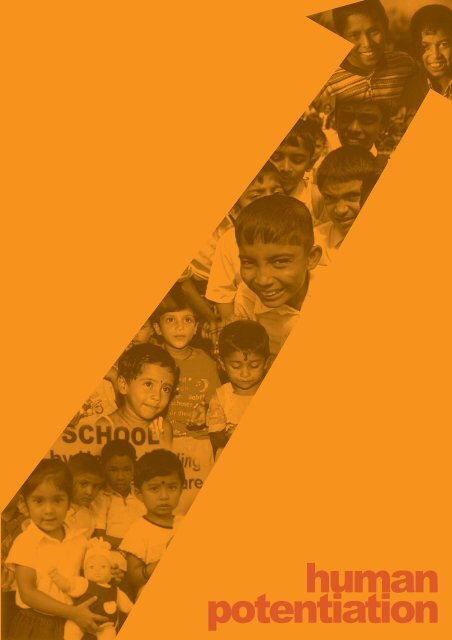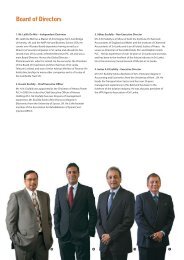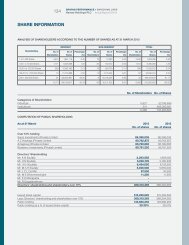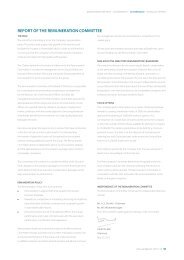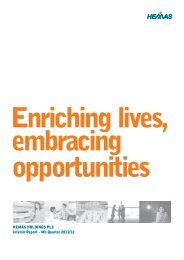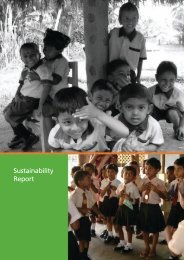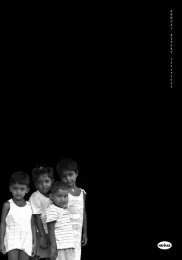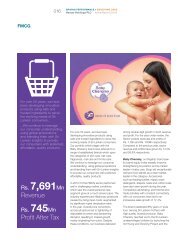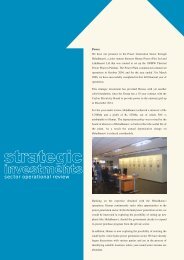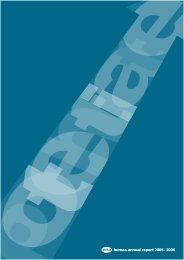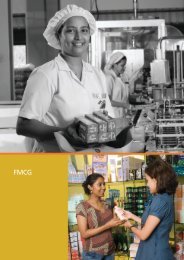15877_HHL Inner Final - Hemas Holdings, Ltd
15877_HHL Inner Final - Hemas Holdings, Ltd
15877_HHL Inner Final - Hemas Holdings, Ltd
You also want an ePaper? Increase the reach of your titles
YUMPU automatically turns print PDFs into web optimized ePapers that Google loves.
human<br />
potentiation
Community Relations<br />
Community Relations<br />
The Piyawara Project focuses on promoting Early Childhood Care and<br />
Development (ECCD) through the establishment of pre-schools across Sri<br />
Lanka. In the wake of the tsunami in December 2004, <strong>Hemas</strong> drew on the<br />
experience it had garnered in the field of ECCD as a result of Piyawara, to<br />
develop a project that would be targeted at young children who were<br />
affected by the disaster.<br />
Tsunami Reconstruction<br />
Following the tsunami, several projects were undertaken to rebuild schools<br />
that offered education from primary to advanced levels, yet very little<br />
attention was being paid to the reconstruction of pre-schools. With 150<br />
pre-schools destroyed or damaged by the tsunami, new centres for early<br />
childhood education were essential to provide learning fundamentals to<br />
students between the ages of 2-5 years.<br />
The <strong>Hemas</strong> Tsunami Disaster Relief Task Force and <strong>Hemas</strong> Tsunami<br />
Foundation was set up in the immediate aftermath of the tsunami, with the<br />
objective of constructing pre-schools across the southern and eastern<br />
coastal regions of the country. The project was undertaken with funding<br />
from <strong>Hemas</strong> and its business partners around the world. The key donors to<br />
the fund were LTU Touristik, DRV (German Travel Association) and<br />
<strong>Hemas</strong> <strong>Holdings</strong> <strong>Ltd</strong>.<br />
The first phase of the project involved the establishment of 27 temporary<br />
pre-schools at the makeshift camps that housed people who had lost their<br />
homes to the tsunami. There was an urgent need for these temporary<br />
schools, as it was envisaged that the displaced people would continue to<br />
inhabit these camps for at least a year. The pre-schools were therefore<br />
essential in ensuring a continuous education for young children despite<br />
their extenuating circumstances. <strong>Hemas</strong> equipped the pre-schools with<br />
furniture, books and educational tools, and playgrounds were constructed<br />
with the participation of those living in the camps. A 5-day residential<br />
programme in trauma counselling was also conducted in Colombo for the<br />
teachers at the camps and a monthly allowance was paid to them. These<br />
centres were monitored by the Ministry of Child Development & Women's<br />
Empowerment along with the <strong>Hemas</strong> staff.<br />
Next the <strong>Hemas</strong> Tsunami Disaster Relief Task Force embarked on an<br />
extensive programme to construct 20 permanent pre-schools in the south<br />
and east of Sri Lanka. They are located from Panadura to Hambantota in<br />
the southern coast and Ampara district in the eastern region. Each school<br />
would have facilities that include 4 classrooms serving 25 children in each<br />
class room, junior toilets and wash areas, a staff room and a pantry, a sick<br />
room, a lobby, storage area and a landscaped garden.<br />
32<br />
hemas holdings annual report 2005-2006
Community Relations<br />
To-date, 18 pre-schools have been built, at an investment of approximately<br />
Rs. 85 million. Each pre-school cost almost Rs. 5 million. The pre-schools<br />
are 3,400 square feet in size with a student population of 100. As such the<br />
programme has directly uplifted the lives of 1,800 children already. The<br />
buildings consist of colourful interiors and murals that depict a 'child's<br />
world'. The classrooms are well-equipped with furniture and special<br />
educational equipment.<br />
The Piyawara Pre-schools<br />
The Piyawara Project was initially launched in 2002, and has been<br />
instrumental in upgrading of existing pre-schools in several districts.<br />
Currently there are 12 Piyawara pre-schools stretching from Matara in the<br />
south to Jaffna in the north. The pre-schools located in Polonnaruwa,<br />
Matale and Jaffna also serve as training centres for teachers.<br />
Piyawara is conducted in partnership with the Ministry of Child<br />
Development & Women's Empowerment. The Ministry collaborates with<br />
the provincial councils, to oversee the state-run pre-schools in Sri Lanka.<br />
MOUs are signed with the local councils, with roles and responsibilities<br />
detailed for each of the project partners, to ensure continued monitoring<br />
and evaluation of the pre-schools.<br />
Piyawara goes beyond<br />
simply equipping preschools<br />
with furniture and<br />
books. The project extends<br />
to the entire concept of<br />
ECCD, and creates<br />
awareness on the<br />
importance of early childhood education.<br />
Each of the Piyawara schools is carefully constructed with attention being<br />
paid to design and décor. The aim is to create environments that are childfriendly<br />
and conducive to learning. Piyawara has played a large role in<br />
modernizing the pre-school system in several districts, while retaining<br />
several traditional elements. A “Learning through Activity” approach was<br />
adopted at the schools - using vivid colours for teaching aids, and raising<br />
children's consciousness on the importance of nature and the environment.<br />
Our Mission<br />
To create child friendly pre schools island wide for<br />
children between the ages of 3-5 years in order to<br />
provide a sound foundation for life long learning.<br />
hemas holdings annual report 2005-2006<br />
33
Community Relations<br />
One such initiative was a tree planting project, where 3000 pre-schoolers<br />
were provided with trees to plant in their home gardens. The children are<br />
expected to take care of the plants, with parents and teachers monitoring<br />
progress.<br />
Teacher training is an important aspect of the Piyawara project, and several<br />
on-site and residential training programs are held in partnership with the<br />
Ministry of Child Development and the University of Colombo. Special<br />
programmes are conducted in all centres to educate parents on the<br />
importance of early childhood and these programmes are well attended by<br />
the parents and senior citizens of the village. Parent-Teacher Associations<br />
have also been set up at the schools in order to foster greater parent<br />
participation and to encourage the sustainability of pre-schools.<br />
During the year 2005, the Piyawara Project made excellent progress<br />
towards achieving many of its goals. Three more districts were added to the<br />
programme - Puttalam, Anuradhapura, and Trincomalee, which are in the<br />
Northwestern, North-Central, and Eastern Provinces, with three new<br />
schools being refurbished and opened for operations in January 2006.<br />
Teachers from the new districts were provided with 5-day residential<br />
programmes that were co-ordinated by the Ministry, spending three days in<br />
a workshop environment in Colombo, and two days at Piyawara centres in<br />
Matale and Polonnaruwa. Teachers in all Piyawara Centres were provided<br />
further training with a hands-on training programme in Matale and<br />
Polonnaruwa. A ceremony was held in November 2005 to felicitate the<br />
dedication and hard work put in by the Piyawara pre school teachers<br />
islandwide. Schools in Polonnaruwa, Matale & Jaffna won the awards.<br />
Piyawara community in eight existing centres were enlarged by each centre<br />
fostering three more under-developed pre-schools in their respective areas,<br />
all by courtesy of funding from <strong>Hemas</strong>. The enlargement of the programme<br />
include the construction of special play areas at each of these new schools.<br />
This sharing of knowledge and expertise that has already been gained<br />
through the Piyawara programme, served to touch the lives of many more<br />
children.<br />
Our main focus for the coming year will be on training and awareness. This<br />
will immensely benefit the children and parents alike. Though the<br />
challenges ahead are infinite, we at <strong>Hemas</strong> are determined to champion the<br />
cause of Early Childhood Care & Development, as an investment in the<br />
future generations of Sri Lanka.<br />
34<br />
hemas holdings annual report 2005-2006
Community Relations<br />
<strong>Hemas</strong> assisted ECCD Centres islandwide<br />
Cost Categorisation of the<br />
Pre School Project<br />
Anuradhapura<br />
Polonaruwa<br />
Dambulla<br />
Sigiriya<br />
Kandalama<br />
Kandy<br />
Other Costs<br />
Training and Sustainability Cost<br />
Cost of Temporary Pre Schools<br />
Furniture and Fittings<br />
Rs.<br />
5.1 Mn<br />
1.7 Mn<br />
1.8 Mn<br />
6.4 Mn<br />
Educational Material<br />
1.8 Mn<br />
Negombo<br />
Pinnawela<br />
Peradeniya<br />
Nuwara Eliya<br />
Building Cost<br />
Total<br />
90 Mn<br />
107 Mn<br />
Colombo<br />
Ratnapura<br />
Bandarawela<br />
Bentota<br />
Hikkaduwa<br />
Galle<br />
Schools built through our CSR Projects<br />
Permanent Structures<br />
20<br />
Piyawara Schools<br />
12<br />
Temporary Tsunami Schools<br />
27<br />
0 5 10 15 20 25 30<br />
No. of Schools built<br />
hemas holdings annual report 2005-2006<br />
35
Community Relations<br />
Going Beyond Early Childhood…<br />
In keeping with the <strong>Hemas</strong> tradition of caring for children, the staff at<br />
Nimex Tissue Company, which is now a part of the <strong>Hemas</strong> Group saw an<br />
immediate need to renovate the Doluwa Maha Vidyalaya located in the<br />
vicinity of the factory. The school has a student population of<br />
approximately 750 - 800.<br />
This was a school where 80% of Nimex employees had once studied and<br />
their siblings still attend this school. There was much enthusiasm from the<br />
employees and villages when <strong>Hemas</strong> decided to renovate the school. The<br />
most significant was the setting up of a computer laboratory where new<br />
computers were donated by <strong>Hemas</strong>. The school buildings were renovated,<br />
toilets re-done, broken doors and windows replaced, and roofs and gutters<br />
re-constructed. Light fittings were installed and where necessary re-wiring<br />
was undertaken.<br />
Today, the children of this school are enjoying their new surroundings and<br />
are eagerly acquiring much needed IT skills. The bond between the<br />
students, villages and <strong>Hemas</strong> staff has strengthened and together they are<br />
now planning various initiatives such as special IT educational<br />
programmes, English Language courses to further enrich the lives of the<br />
students at Doluwa Maha Vidyalaya.<br />
36<br />
hemas holdings annual report 2005-2006


